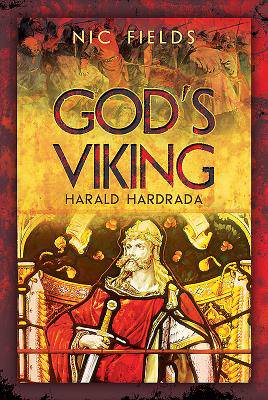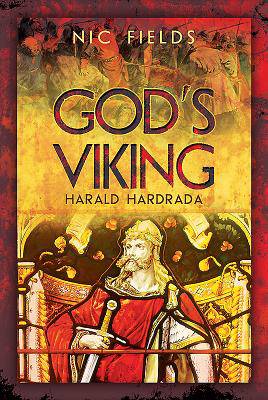
- Afhalen na 1 uur in een winkel met voorraad
- Gratis thuislevering in België vanaf € 30
- Ruim aanbod met 7 miljoen producten
- Afhalen na 1 uur in een winkel met voorraad
- Gratis thuislevering in België vanaf € 30
- Ruim aanbod met 7 miljoen producten
Zoeken
God's Viking: Harald Hardrada
The Life and Times of the Last Great Viking
Nic Fields
Hardcover | Engels
€ 34,95
+ 69 punten
Omschrijving
"If published as a novel, the life of Harald Hardrada (c.?1015-1066) could quite easily be dismissed as highly improbable... God's Viking is an excellent read about a remarkable character." - Strategy Page
Harald Hardrada is perhaps best known as the inheritor of 'seven feet of English soil' in that year of fateful change, 1066. But Stamford Bridge was the terminal point of a warring career that spanned decades and continents. Thus, prior to forcibly occupying the Norwegian throne, Harald had an interesting (and lucrative) career in the Varangian Guard, and he remains unquestionably the most notable of all the Varangians who served the Byzantine emperors: in the latter employment he saw active service in the Aegean, Sicily, Italy, Anatolia, Syria, Palestine and Bulgaria, while in Constantinople he was the hired muscle behind a palace revolution. A man of war, his reign in Norway was to be taken up with a wasteful, vicious and ultimately futile conflict against Denmark, a kingdom (like England) he believed was his to rule. We follow Harald's life from Stiklestad, where aged fifteen he fought alongside his half-brother king Olaf, through his years as a mercenary in Russia and Byzantium, then back to Norway, ending with his death in battle in England.
Harald Hardrada is perhaps best known as the inheritor of 'seven feet of English soil' in that year of fateful change, 1066. But Stamford Bridge was the terminal point of a warring career that spanned decades and continents. Thus, prior to forcibly occupying the Norwegian throne, Harald had an interesting (and lucrative) career in the Varangian Guard, and he remains unquestionably the most notable of all the Varangians who served the Byzantine emperors: in the latter employment he saw active service in the Aegean, Sicily, Italy, Anatolia, Syria, Palestine and Bulgaria, while in Constantinople he was the hired muscle behind a palace revolution. A man of war, his reign in Norway was to be taken up with a wasteful, vicious and ultimately futile conflict against Denmark, a kingdom (like England) he believed was his to rule. We follow Harald's life from Stiklestad, where aged fifteen he fought alongside his half-brother king Olaf, through his years as a mercenary in Russia and Byzantium, then back to Norway, ending with his death in battle in England.
Specificaties
Betrokkenen
- Auteur(s):
- Uitgeverij:
Inhoud
- Aantal bladzijden:
- 336
- Taal:
- Engels
Eigenschappen
- Productcode (EAN):
- 9781473823426
- Verschijningsdatum:
- 8/02/2020
- Uitvoering:
- Hardcover
- Formaat:
- Genaaid
- Afmetingen:
- 152 mm x 229 mm
- Gewicht:
- 793 g

Alleen bij Standaard Boekhandel
+ 69 punten op je klantenkaart van Standaard Boekhandel
Beoordelingen
We publiceren alleen reviews die voldoen aan de voorwaarden voor reviews. Bekijk onze voorwaarden voor reviews.











